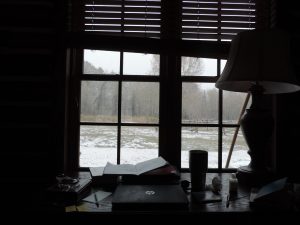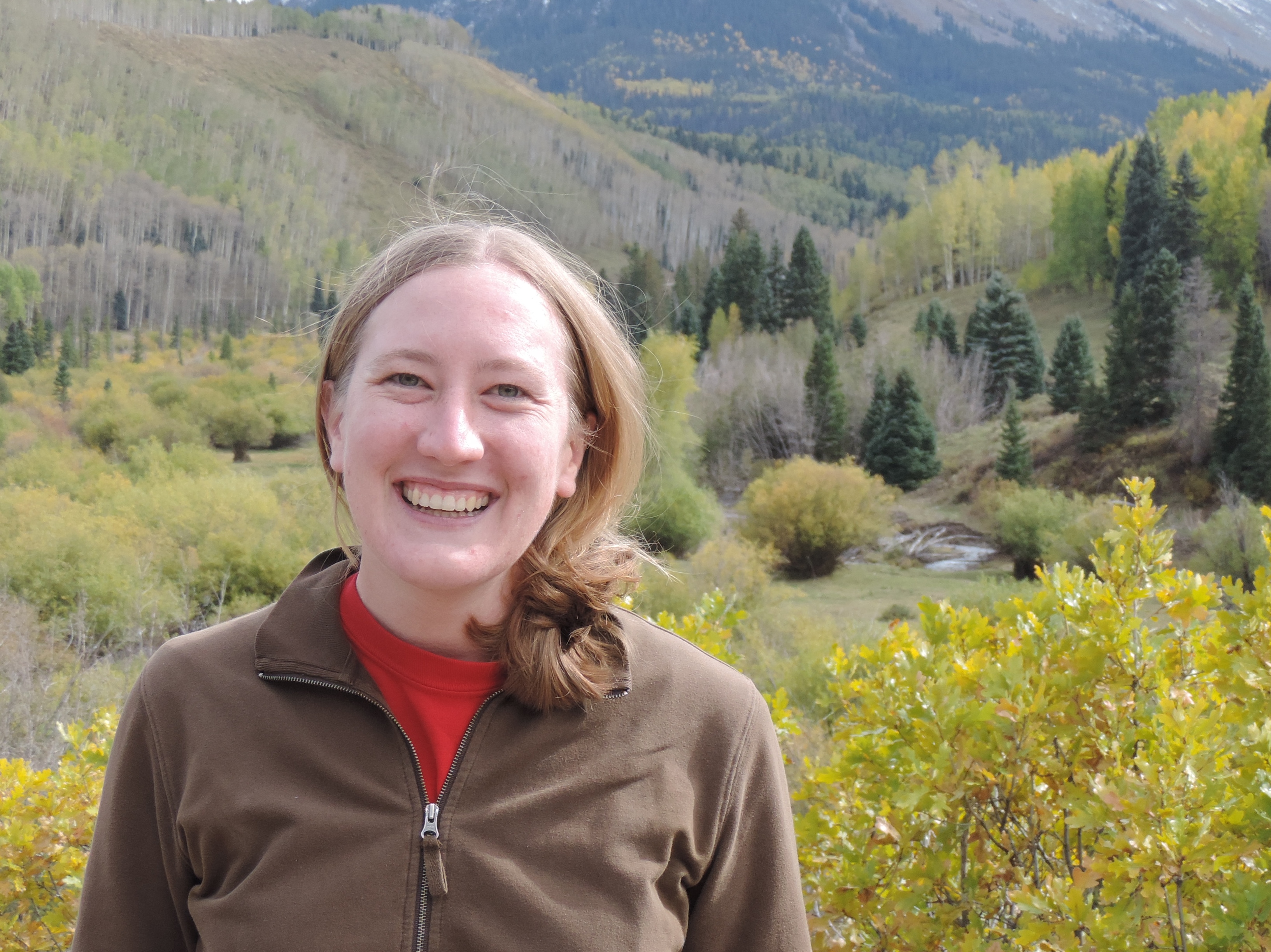I don’t want to dwell on how terrified I was when I graduated from Ohio Wesleyan University in 2012, but I had a lot of fears. And I don’t want to parse out which ones were irrational, but I was really, really afraid that I would stop writing.
Leaving the environment where writing is due and workshops full of people read my work regularly, it was hard to imagine other writing communities. I learned a lot about writing in college, but I wasn’t sure how to go forward. When I asked, many established writers told stories about being in the right place at the right time. But the professional writers I admired had built their careers in an economy, a publishing culture, and a technological landscape that simply doesn’t exist anymore. How do you put yourself in the right place at the right time, now? And meanwhile, as I’m waiting for the lightning to strike, what the heck do I do?

Writing Friends: Left to Right, Celia Baker, Mary Slebodnik, Abigail Dockter, Emily Neldon. Photo credit: Cristy Dockter
I left OWU with a true liberal arts cocktail: a double degree in English and Sociology/Anthropology, a healthy helping of Botany classes, and an active interest in history, religion, geography, and the environment. When I graduated, I did data entry and lab work. I did fieldwork in archaeology and botany. I edited the English translation of a Romanian matchmaking web site, and I updated the mailing list for a journal of prison art and writing. Between jobs, I spent several months with my grandmother and then several months in Australia, working on farms in exchange for room and board. I wrote, though I wasn’t sure what to do with the writing. I missed talking about books.
So, pre-“OWU English Alumni” page, I started a Facebook group. I invited all my workshop friends. At first, the idea was to keep the workshop energy going with a low-commitment online writing group, but it morphed into something just as great: a platform to post our writing experiences and successes. Whenever someone got a teaching gig, wrote a blog post, won an award, did a poetry reading, worked an internship, got a grant, finished a thesis, started a funding campaign, or wrote an article—we were ready to celebrate it. The size of the accomplishment was not important, and the type of writing didn’t matter. What mattered was that we continued to use and share our skills, even on a very small scale. What mattered was that we kept writing. By these standards, even rejection is cause for celebration, a sign that you haven’t quit.

The view from Abby’s room at The Brush Creek Writer’s Residency in Saratoga, Wyoming
The truth is that I learned far more about how to be a writer from my peers and people who graduated a year or two ahead of me than I did from established professional writers. By keeping in touch with other English majors and workshop friends, I learned where they found their writing opportunities. I read the articles they posted on social media and looked at the web sites that published them. When I was ready to go back to school for Creative Writing, I asked about their experiences in MFA programs. I watched the ways they found to keep writing, even if they weren’t making a living doing it. Creative people must do many different things to get by. But I could see that it was possible to get by, and that no matter how you spend the majority of your time, you can still write. There is no reason to stop.
The English majors who graduated with me own businesses. They teach in middle schools and universities and yoga studios. They act, dance, and perform. They raise kids. They grow trees. They edit other people’s writing. They work in libraries and archives. But they also write, and witnessing that was important to me. I needed reminders that you don’t stop being a writer just because you don’t put it on your tax returns (also, tax reporting for freelancers is a true nightmare). What makes you a writer is that you keep doing it.
Here are some ideas to keep writing that don’t take any money and that you can start right away.
- Stay in touch with your friends, celebrate their successes, and take note of how they pursue their writing goals. The world changes fast, and we need each other’s support and advice. Actually, we just plain need each other.
- Read things other than books. I love books, but that doesn’t mean I’m ready to write one immediately. Find the writing you love in local magazines, in newspapers, in web publications, and in lit mags. Maybe you’ll find a place where your own ideas would fit in.
- But read books too—and write a book review. If you read something great that others should know about, this is a perfect way to keep using your lit crit skills. Lots of web sites publish reviews, but why not start by submitting to The Night Owl or The Sturges Script?
- Learn to interview people. This was one bonus from double-majoring in Sociology. Most people learn how to be interviewed for jobs, but for a writer, it’s equally important to learn how to reach out to people and ask questions. Yes, even for fiction writers. Dream big—you would be amazed at who responds to emails out of the blue. There are many opportunities to publish interviews and conversations with authors, too.
- Keep writing, and keep celebrating it. Blog posts, ads, reports for your job—it all counts. The writing that no one sees, your journal that keeps you sane—it counts. The queries and pitches you write to publications, even if you never get a response, count. The half-finished poems in the drawer and in the folder on your computer all count. If you ask me, even emails count, especially to friends and family. They all mean you kept writing.
Seven years after graduating, I’m still working weird, wonderful jobs—doing archaeology, teaching, being a research assistant. And I’m still writing. I have many irrational fears, but I’m not afraid that I’ll stop writing. I depend on my writing communities in moments of both disappointment and gratitude. Sometimes I am the one being inspired by other people’s work, and sometimes I’m the one doing the supporting—I think that qualifies as being in the right place at the right time.

